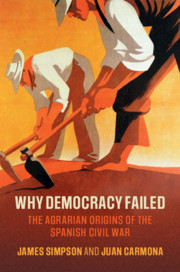Book contents
- Why Democracy Failed
- Cambridge Studies in Economic History
- Why Democracy Failed
- Copyright page
- Dedication
- Contents
- Figures
- Maps
- Tables
- Acknowledgements
- Notes on the Regional Division of Spain
- Abbreviations
- Introduction
- Part I The European Experience: Economic and Political Development, 1870–1939
- Part II Spanish Agriculture, Economic Development, and Democracy
- Part III Explaining the Weakness of the Family Farm
- 5 The Family Farm and the Limits to Village-Level Cooperation
- 6 The Persistence of the Landed Elites and the Nature of Farm Lobbies
- Part IV Rural Elites, Poverty, and the Attempts at Land Reform
- Part V Rural Conflicts and the Polarization of Village Society
- Book part
- Glossary
- Bibliography
- Index
6 - The Persistence of the Landed Elites and the Nature of Farm Lobbies
from Part III - Explaining the Weakness of the Family Farm
Published online by Cambridge University Press: 17 April 2020
- Why Democracy Failed
- Cambridge Studies in Economic History
- Why Democracy Failed
- Copyright page
- Dedication
- Contents
- Figures
- Maps
- Tables
- Acknowledgements
- Notes on the Regional Division of Spain
- Abbreviations
- Introduction
- Part I The European Experience: Economic and Political Development, 1870–1939
- Part II Spanish Agriculture, Economic Development, and Democracy
- Part III Explaining the Weakness of the Family Farm
- 5 The Family Farm and the Limits to Village-Level Cooperation
- 6 The Persistence of the Landed Elites and the Nature of Farm Lobbies
- Part IV Rural Elites, Poverty, and the Attempts at Land Reform
- Part V Rural Conflicts and the Polarization of Village Society
- Book part
- Glossary
- Bibliography
- Index
Summary
Unlike most Western European countries, Spain’s landed elites and Church hierarchy remained politically and economically strong before the Great Depression. Spanish farm lobbies therefore continued to reflect the interests of large landowners and cereal farmers, whose demand for higher tariffs led to an expansion in wheat cultivation, despite the country’s weak competitive advantage. By contrast, family farmers, despite representing around a third of the electorate, were politically under-represented, which would have important consequences for the democratic experiment during the Second Republic. Neither the landed elites nor the Church hierarchy were required to participate in mass political parties before 1931, which limited their interest in organizing village-level cooperatives into federations, and at the same time helped them to preserve their traditional powers. Catalonia was the exception, as regional political demands required the landed elites to participate in mass politics, and explains the success of local farm cooperatives and rural associations.
- Type
- Chapter
- Information
- Why Democracy FailedThe Agrarian Origins of the Spanish Civil War, pp. 128 - 152Publisher: Cambridge University PressPrint publication year: 2020

